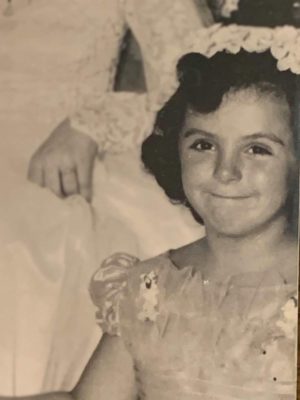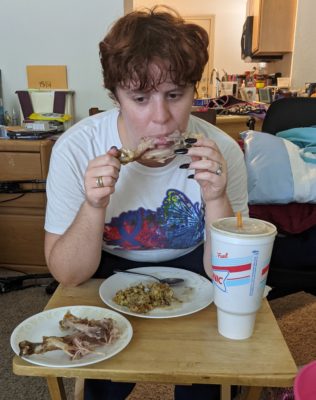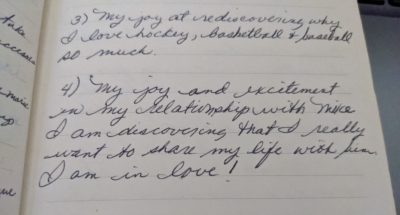This post describes, my recovery from the loss of my wife to a degenerative neurological condition called Huntington’s Disease. She was healed of this condition when she went to live with our Heavenly Father at 2:30AM, the 10th of January 2021. You can read the announcement here.
Or if you would like to read our story from the beginning, you can start with: How We Got Here…
I want to start this week with a word of gratitude for the support that has been showered on my daughter Frannie and me. At one point, I thought of trying to respond to each one of you, but that plan quickly proved impractical. In the first place, there were so many comments that I couldn’t keep up with them all. But more importantly, I’m not totally sure that I even saw them all. The problem is that when you start receiving a lot of comments, Facebook doesn’t generate notifications for every one. So let me just say to all of you who commented, liked, or otherwise reacted to my posts about Janet’s passing: Thank you so much! It has been a true blessing to my family as we navigate these uncertain waters.
I want to especially thank all of you who shared how my writing has helped you to, in some small way, confront the challenges that you have before you – which is exactly what I was hoping to accomplish when I started this effort some 14 months ago.
One of the hardest parts of this effort has always been to keep myself engaged. As I have alluded to many times, the challenge is to resist the strong impulse to hide behind a façade that would allow me to avoid letting people really see what was happening in our life. But what kept bringing me back was the sure knowledge that what really heals (myself and others) is not convincing myself that everything is okay, but ripping off the bandages so others can see the wounds and burns – especially the self-inflicted ones. The simple truth is that those sorts of things are what give hope, and hope is what enable us to survive what we are going through.
Of course, that truth runs counter to what our culture is constantly telling us. Culture tells us that only perfection is acceptable – no wonder we see so much hopelessness around us. The mere hint of a skeleton hiding in someone’s closet is enough to get them ostracized and “canceled.” No wonder, also that there is so little intellectual honesty. Many people feel – and not without reason – that they can’t afford to be honest. Recently, I read an essay by a fellow named Brad Listi and one sentence really jumped out at me:
…I think that in the age of social media, we get to curate ourselves to such a fanatical degree that a lot of people have become masterly (sic) at cultivating online personas or a written persona or a digitally presented persona that is sort of like Teflon—all the rough edges are sanded away.
Setting to one side the fact that the author clearly has no idea what Teflon is, that statement certainly rings true as an indictment of the cultural environment that surrounds us every day. But for the most part that is not what I have found here among the folks that read and respond to my writing. So again, let me thank you all for the support, strength, and hope that you have given me and my family. We’ll get each other through this…
Whatever you are going through right now, it is survivable.
❦ ❦ ❦ ❦ ❦ ❦
Recently, in sharing the story of what has been happening in my life. I have had quite a few people say to me that with Janet gone, I can at least do what I want to do now. To be clear, I have no doubt what they meant when they spoke those words to me. What they intended to say was that at least life will be easier now, without the burden of caring for a terminally ill spouse – a point which is most certainly true!
However, given the way my brain works, it didn’t take me long to see that although they didn’t mean it in this way, the statement had an alternate understanding that highlighted a truth about myself, and I would suspect many other caregivers. That same statement could also imply that in some way my service to Janet was something that I was forced to do – it is that idea that I want to explore a bit.
Underlying the idea of being “forced” to serve is the belief that no one in their right mind would choose to do things that are hard and unpleasant. Perhaps this is why so many people today have a hard time understanding people in the military, first responders, … and of course, caregivers. We live in a society where the main deity being worshiped is named “Self.” Hence, even when people talk about altruism, it is often couched in terms that are ultimately selfish. For example, we are told that we should give to one cause or another because it “feels good to do good.” In other words, altruism isn’t really about helping the other person: it’s about making yourself feel good.
However, real altruism often imposes far more penalties than it bestows benefits. All caregivers have at one time or another gone to bed mentally and physically exhausted, and the only (minimal) comfort they had was that they did what needed to be done. Perhaps that is the normal state of affairs for you right now. I can certainly remember many times when it was so for me. A phrase that is often heard during the grueling training required to become a Navy Seal is, “Embrace the suck.” One former Seal has written a book of the same name. He says that what the phrase means is to:
…Lean into the suffering and get comfortable being very uncomfortable.
Whether you are fighting a war against a foreign enemy or a disease that is slowly destroying your loved one, in many ways the personal challenge is the same: proactively learning to get comfortable with being uncomfortable.
People have asked whether I wished that I had chosen a different path in life, and my answer is always the same. I would have preferred that Janet and her father did not have Huntington’s Disease. I would have preferred being able to spend more time laughing and cuddling with Janet. I would have preferred retiring and growing old with Janet while travelling around the country in an RV visiting our kids and grandkids. I would have preferred all those things and so much more, but all those preferences have one thing in common: they weren’t possible. And, as the title of this post points out, “You can’t choose what you can’t choose.”
I couldn’t choose a different circumstance or a different Janet because those options didn’t exist. At the end of the day we all – the great and the small – have to deal with what really is, and reality always wins out. We can for a time choose to ignore reality, but that is not the same thing as changing what is ultimately true. I could have chosen to divorce Janet when it became clear that she was not changing as I thought she would in response to my love. I could have also chosen to divorce her years later when I learned why she was not changing. Then there were multiple times when I could have chosen to divorce her for being verbally and physically abusive.
However, none of those “choices” would have changed the underlying reality that Janet was desperately sick and needed help. And none of them would change the reality of her ultimate fate, because ignoring reality doesn’t make it less real. Moreover, while reality may be uncomfortable or even painful, the thing to remember is that the very attempt to ignore reality imposes its own penalty that gets added on top of any discomfort that reality imposes.
So you hurt because reality sometimes stinks, and you have additional pain from trying to ignore it.
In the end, I choose reality. I choose to take on the job in front of me, to serve and to get comfortable with being uncomfortable.
And I thank God for the opportunity to do so.
In Christ, Amen ☩
❦ ❦ ❦ ❦ ❦ ❦
A prayer for when you are feeling “uncomfortable”…
“Blessed are You, Lord God, King of the Universe. It is right that I should at all times and in all circumstances bless You for the beauty of the cosmos that you created. But today I want to bless You especially for the times when reality is not particularly beautiful or pleasant. Help me to remember that I am living in a world that is broken and hurting, and remind me that you are setting things right, bit by bit. Thank you also for using me – flawed though I may be – to effect change and to help in setting things right. Please Lord, show me how to keep my eyes open to the brokenness around me and give me the courage and wisdom to set it right. Amen.”





